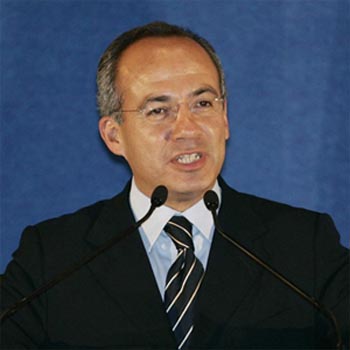Mexico seeks solutions in London for crisis, violence
 Buenos Aires - Mexican President Felipe Calderon is likely to press a double demand when he attends the G20 summit in London next month, with the global crisis and the wave of violence that hits Mexico giving him many headaches in recent months.
Buenos Aires - Mexican President Felipe Calderon is likely to press a double demand when he attends the G20 summit in London next month, with the global crisis and the wave of violence that hits Mexico giving him many headaches in recent months.
On the one hand, as the leader of the 13th-largest economy in the world, he will be seeking to curb the severe effects that the international financial and economic crisis is having on Mexico, a country that is very heavily dependent on its northern neighbour, the now-troubled United States.
On the other hand, Calderon will make yet another attempt to turn drug-trafficking - at the heart of the violence that left some 6,300 dead last year in Mexico, and killed more than 1,000 others since January - into a global problem, with illegal-drug-consuming countries like the United States and the members of the European Union taking more responsibility for the fight against drug gangs.
Mexico sends over 80 per cent of its exports to the United States. Moreover, it also exports labour to its northern neighbour, and these workers send money to their families back home when they do well.
In the current context of severe crisis, Mexico is not only seeing its main - indeed, almost exclusive - export market shrink but it is also experiencing a 3-per-cent fall in remittances in 2008 and the return of many workers who once travelled across the border in search of a better life.
Some 80,000 Mexican migrants returned to their native country from the United States during 2008, according to researcher Ruben Sandoval, of the University of Baja California. The estimated number of returning migrants is expected to soar to 250,000 in 2009, and Sandoval stressed that their return is bound to have a strong economic, social and cultural impact on Mexico as well as an effect on family life and security.
The phenomenon of returning migrants and falling remittances which once helped many families out of poverty is common to Mexico and many Central American and Caribbean countries. The leaders of smaller nations with this problem have made it clear that they expect help from Washington, since they cannot handle the influx on their own.
"The strong fall in aggregate demand and employment in the United States is having a negative impact on economic activity in Mexico," the Mexican central bank said in late February.
The bank estimates that Mexico's GDP will decrease by 0.8-1.8 per cent during 2009.
Calderon has been busy courting foreign investors. That is why he was displeased when Mexican telecommunications tycoon Carlos Slim - the third-richest man in the world, worth some 35 billion dollars according to Forbes' most recent list - said Mexico's economy was on the brink of collapse.
"I do not want to be alarmist, but we have to get ready to look ahead and not look at the consequences afterwards and cry," Slim said in February.
At the World Economic Forum in Davos in January, Calderon stressed that Mexico's banking system is in fine health, and he highlighted Latin America's potential as an outlet for investment at a time of crisis.
At the time, he stressed "common interests" among Latin American countries, and he is bound to team up with Brazilian President Luiz Inacio Lula da Silva - the leader of the 10th-largest economy in the world - in London.
Amidst the financial crisis, Mexico has another open front in organized-crime violence. And - just as Lula and others demand a greater commitment from Washington to help smaller economies cope with the crisis generated in the northern giant - Calderon would like to see greater cooperation from abroad in the fight against violence.
Earlier this month, he demanded from the United States both solidarity and "explicit support that is reflected in resources, cooperation and intelligence-generating information" as Mexico seeks to curb drug violence.
Calderon has called upon the United States - which he pointedly termed "the world's main drug market" and "the main weapons market for the criminal organizations that operate on both sides of the border" - to contain demand for illicit drugs and stem the flow of money and weapons to the hands of Mexican gangs. (dpa)